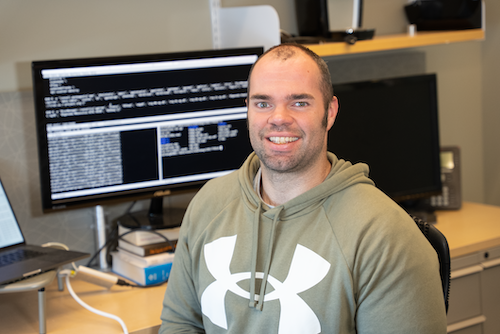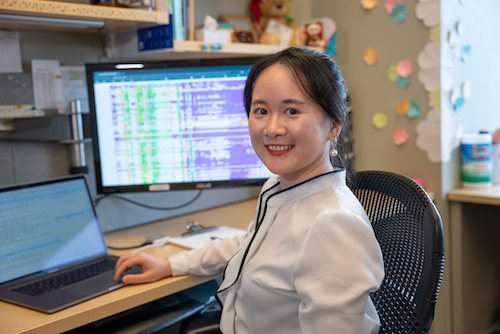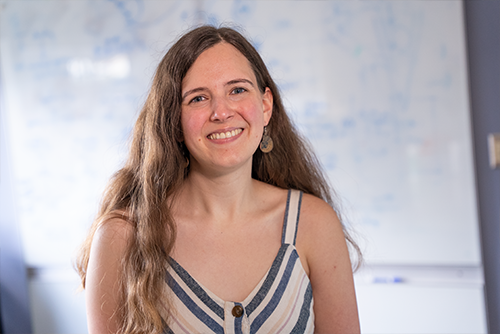Systems, Computational, and Quantitative Biology Program
In this program, students will learn concepts and methods of systems and computational biology. Students will learn how to analyze gene-regulatory networks, spatial architecture of genomes, metabolic networks, and epigenomics. Students will also learn bioinformatic techniques, used for analyzing large-scale data such as RNA-Seq and Hi-C datasets, as well as statistical methods such as methods for dimensional reduction of complex data. Courses will emphasize both hands-on learning, such as in programming sessions, and active discussions. Students will learn skills that are useful for both basic and translational research.
REQUIREMENTS FOR SPECIALIZATION
As of September 2025, the requirement for a third elective course is suspended. Students are advised to meet their specific BBS Umbrella Program course requirements. Students may take additional elective courses as they wish.
All Basic Biomedical Science students must complete the core curriculum as well as electives required by their program. Students in the Systems, Computational, and Quantitative Biology Program must take 2 graded, elective courses of 2-4 credits each in Bioinformatics. Students choose elective courses from among those offered by the program, or relevant courses offered by other Morningside Graduate School of Biomedical Sciences programs. The plan of coursework is designed to be flexible in order to accommodate each student’s needs and areas of interest.
OUR LEADERSHIP AND FACULTY
PROGRAM CO-DIRECTOR

Job Dekker, PhD
Professor
email Dr. Dekker
PROGRAM CO-DIRECTOR

Raluca Gordan, PhD
Professor
email Dr. Gordan
OUR STUDENTS
STUDENT SPOTLIGHT
Gregory Andrews, PhD'24
 Gregory Andrews, PhD'24, studied transcription factor binding with his mentor, Zhiping Weng, PhD, Li Weibo Chair in Biomedical Research, professor of biochemistry & molecular biotechnology and director of the Program in Bioinformatics & Integrative Biology, using deep learning, a state-of-the-art machine learning technology.
Gregory Andrews, PhD'24, studied transcription factor binding with his mentor, Zhiping Weng, PhD, Li Weibo Chair in Biomedical Research, professor of biochemistry & molecular biotechnology and director of the Program in Bioinformatics & Integrative Biology, using deep learning, a state-of-the-art machine learning technology.
Kaili Fan, MSc, PhD'23
 Kaili Fan selected UMass Chan’s Program in Bioinformatics and Computational Biology specifically for the opportunity to be mentored by Zhiping Weng, PhD, Li Weibo Chair in Biomedical Research, professor of biochemistry & molecular biotechnology and director of the Program in Bioinformatics & Integrative Biology.
Kaili Fan selected UMass Chan’s Program in Bioinformatics and Computational Biology specifically for the opportunity to be mentored by Zhiping Weng, PhD, Li Weibo Chair in Biomedical Research, professor of biochemistry & molecular biotechnology and director of the Program in Bioinformatics & Integrative Biology.
Kathleen Morrill, PhD'23th
 Kathleen Morrill did her dissertation on the behavioral genomics of domestic dogs. Her mentor was Elinor Karlsson, PhD, associate professor of molecular medicine. Rotating through different labs in her first year at UMass Chan allowed Morrill to find a new enthusiasm for computational biology.
Kathleen Morrill did her dissertation on the behavioral genomics of domestic dogs. Her mentor was Elinor Karlsson, PhD, associate professor of molecular medicine. Rotating through different labs in her first year at UMass Chan allowed Morrill to find a new enthusiasm for computational biology.
POST-DEGREE CAREERS
The BCB program has prepared students for careers at leading companies and academic institutions in the field of Bioinformatics.
KAILI FAN
Weng Lab, October 2022
POSTDOCTORAL ASSOCIATE, JASON BUENROSTRO LAB
Harvard University, Boston, MA
Dissertation: Leveraging Multi-Omic Data to Characterize Cis-Regulatory Elements and Investigate Their Roles in Gene Regulation
KYLE GELLATLY
Garber Lab, November 2021
MACHINE LEARNING ENGINEER
FoxyAI, Huntington, NY
Dissertation: Network analysis of human vitiligo scRNA-seq data reveals complex mechanisms of immune activation
TYLER BORRMAN
Weng Lab, November 2020
SCIENTIST
PACT Pharma, San Francisco, CA
YASIN KAYMAZ
Bailey Lab, July 2017
BIOINFORMATICS SCIENTIST
Harvard University, Cambridge, MA
Dissertation: Genomic and Transcriptomic Investigation of Endemic Burkitt Lymphoma and Epstein Barr Virus.
BRYAN LAJOIE
Dekker Lab, February 2016
INFORMATICS SOLUTION ARCHITECT
Illumina, San Diego, CA
JILL MOORE
Weng Lab, October 2017
ASSISTANT PROFESSOR
UMass Chan Medical School, Worcester, MA
Dissertation: Defining a Registry of Candidate Regulatory Elements to Interpret Disease-Associated Genetic Variation.
MERCEDEH JAVANBAKHT MOVASSAGH
Bailey Lab, April 2019
POSTDOCTORAL RESEARCH FELLOW
Harvard T.H. Chan School of Public Health in Biostatistics
Cambridge, MA
WEI WANG
Weng Lab, October 2015
SENIOR BIOINFORMATICS SCIENTIST
Voyager Therapeutics, Cambridge, MA
Dissertation: Unveiling Molecular Mechanisms of piRNA Pathway from Small Signals in Big Data.
JIALI ZHUANG
Weng Lab, September 2015
BIOINFORMATICS SCIENTIST
Molecular Stethoscope, San Diego, CA
Dissertation: Structural Variation Discovery and Genotyping from Whole Genome Sequencing: Methodology and Applications.
